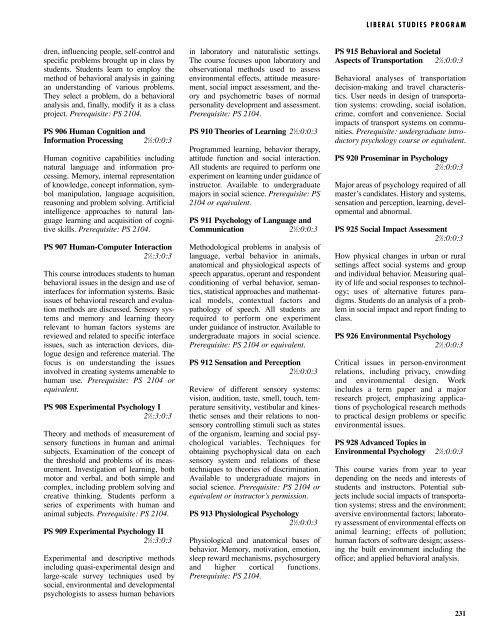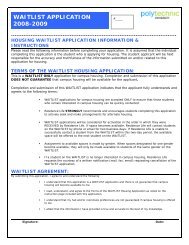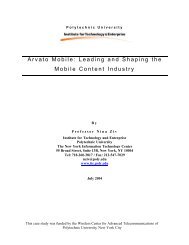POLYTECHNIC UNIVERSITY 2005-2007
POLYTECHNIC UNIVERSITY 2005-2007
POLYTECHNIC UNIVERSITY 2005-2007
You also want an ePaper? Increase the reach of your titles
YUMPU automatically turns print PDFs into web optimized ePapers that Google loves.
LIBERAL STUDIES PROGRAM<br />
dren, influencing people, self-control and<br />
specific problems brought up in class by<br />
students. Students learn to employ the<br />
method of behavioral analysis in gaining<br />
an understanding of various problems.<br />
They select a problem, do a behavioral<br />
analysis and, finally, modify it as a class<br />
project. Prerequisite: PS 2104.<br />
PS 906 Human Cognition and<br />
Information Processing 2 1 ⁄2:0:0:3<br />
Human cognitive capabilities including<br />
natural language and information processing.<br />
Memory, internal representation<br />
of knowledge, concept information, symbol<br />
manipulation, language acquisition,<br />
reasoning and problem solving. Artificial<br />
intelligence approaches to natural language<br />
learning and acquisition of cognitive<br />
skills. Prerequisite: PS 2104.<br />
PS 907 Human-Computer Interaction<br />
2 1 ⁄2:3:0:3<br />
This course introduces students to human<br />
behavioral issues in the design and use of<br />
interfaces for information systems. Basic<br />
issues of behavioral research and evaluation<br />
methods are discussed. Sensory systems<br />
and memory and learning theory<br />
relevant to human factors systems are<br />
reviewed and related to specific interface<br />
issues, such as interaction devices, dialogue<br />
design and reference material. The<br />
focus is on understanding the issues<br />
involved in creating systems amenable to<br />
human use. Prerequisite: PS 2104 or<br />
equivalent.<br />
PS 908 Experimental Psychology I<br />
2 1 ⁄2:3:0:3<br />
Theory and methods of measurement of<br />
sensory functions in human and animal<br />
subjects. Examination of the concept of<br />
the threshold and problems of its measurement.<br />
Investigation of learning, both<br />
motor and verbal, and both simple and<br />
complex, including problem solving and<br />
creative thinking. Students perform a<br />
series of experiments with human and<br />
animal subjects. Prerequisite: PS 2104.<br />
PS 909 Experimental Psychology II<br />
2 1 ⁄2:3:0:3<br />
Experimental and descriptive methods<br />
including quasi-experimental design and<br />
large-scale survey techniques used by<br />
social, environmental and developmental<br />
psychologists to assess human behaviors<br />
in laboratory and naturalistic settings.<br />
The course focuses upon laboratory and<br />
observational methods used to assess<br />
environmental effects, attitude measurement,<br />
social impact assessment, and theory<br />
and psychometric bases of normal<br />
personality development and assessment.<br />
Prerequisite: PS 2104.<br />
PS 910 Theories of Learning 2 1 ⁄2:0:0:3<br />
Programmed learning, behavior therapy,<br />
attitude function and social interaction.<br />
All students are required to perform one<br />
experiment on learning under guidance of<br />
instructor. Available to undergraduate<br />
majors in social science. Prerequisite: PS<br />
2104 or equivalent.<br />
PS 911 Psychology of Language and<br />
Communication 2 1 ⁄2:0:0:3<br />
Methodological problems in analysis of<br />
language, verbal behavior in animals,<br />
anatomical and physiological aspects of<br />
speech apparatus, operant and respondent<br />
conditioning of verbal behavior, semantics,<br />
statistical approaches and mathematical<br />
models, contextual factors and<br />
pathology of speech. All students are<br />
required to perform one experiment<br />
under guidance of instructor. Available to<br />
undergraduate majors in social science.<br />
Prerequisite: PS 2104 or equivalent.<br />
PS 912 Sensation and Perception<br />
2 1 ⁄2:0:0:3<br />
Review of different sensory systems:<br />
vision, audition, taste, smell, touch, temperature<br />
sensitivity, vestibular and kinesthetic<br />
senses and their relations to nonsensory<br />
controlling stimuli such as states<br />
of the organism, learning and social psychological<br />
variables. Techniques for<br />
obtaining psychophysical data on each<br />
sensory system and relations of these<br />
techniques to theories of discrimination.<br />
Available to undergraduate majors in<br />
social science. Prerequisite: PS 2104 or<br />
equivalent or instructor’s permission.<br />
PS 913 Physiological Psychology<br />
2 1 ⁄2:0:0:3<br />
Physiological and anatomical bases of<br />
behavior. Memory, motivation, emotion,<br />
sleep reward mechanisms, psychosurgery<br />
and higher cortical functions.<br />
Prerequisite: PS 2104.<br />
PS 915 Behavioral and Societal<br />
Aspects of Transportation 2 1 ⁄2:0:0:3<br />
Behavioral analyses of transportation<br />
decision-making and travel characteristics.<br />
User needs in design of transportation<br />
systems: crowding, social isolation,<br />
crime, comfort and convenience. Social<br />
impacts of transport systems on communities.<br />
Prerequisite: undergraduate introductory<br />
psychology course or equivalent.<br />
PS 920 Proseminar in Psychology<br />
2 1 ⁄2:0:0:3<br />
Major areas of psychology required of all<br />
master’s candidates. History and systems,<br />
sensation and perception, learning, developmental<br />
and abnormal.<br />
PS 925 Social Impact Assessment<br />
2 1 ⁄2:0:0:3<br />
How physical changes in urban or rural<br />
settings affect social systems and group<br />
and individual behavior. Measuring quality<br />
of life and social responses to technology;<br />
uses of alternative futures paradigms.<br />
Students do an analysis of a problem<br />
in social impact and report finding to<br />
class.<br />
PS 926 Environmental Psychology<br />
2 1 ⁄2:0:0:3<br />
Critical issues in person-environment<br />
relations, including privacy, crowding<br />
and environmental design. Work<br />
includes a term paper and a major<br />
research project, emphasizing applications<br />
of psychological research methods<br />
to practical design problems or specific<br />
environmental issues.<br />
PS 928 Advanced Topics in<br />
Environmental Psychology 2 1 ⁄2:0:0:3<br />
This course varies from year to year<br />
depending on the needs and interests of<br />
students and instructors. Potential subjects<br />
include social impacts of transportation<br />
systems; stress and the environment;<br />
aversive environmental factors; laboratory<br />
assessment of environmental effects on<br />
animal learning; effects of pollution;<br />
human factors of software design; assessing<br />
the built environment including the<br />
office; and applied behavioral analysis.<br />
231




